Foreword
The Climate Governance Barometer (CGB) is the survey analysis developed by the Risk Society and Policy Research Center, National Taiwan University (RSPRC) to illustrate public attitudes toward climate issues in Taiwan. There are two principal reasons for the significance of climate change issues to Taiwan. On the one hand, the increasing frequency of extreme climate events like typhoons and droughts, has caused lots of loss and damage, directly impacting citizens' daily lives and safety. On the other hand, as one of the world's most important economies, Taiwan faces the potential challenges of meeting international commitments and reducing greenhouse gas (GHG) emissions. However, based on the developmental state approach, Taiwan's industrial structure demands a substantial energy supply and contributes a considerable amount of GHG from the production process. Therefore, Taiwan has the responsibility to promote the net-zero transition. This is a matter of fulfilling international obligations and upholding a responsibility to future generations.
We believe that because Taiwan is a democratic society, public support and participation are crucial for the above-mentioned net-zero transitions. Consequently, analyzing and understanding public attitudes are needed for the climate decision-making process. By the review of past public opinion surveys, we can gain a deeper understanding of citizen's attitudes toward the public sector to formulate more effective and acceptable climate policies in the future.
In recent years, academic institutions have conducted some public opinion surveys on climate issues. CGB collects survey data from academic research from RSPRC and Academia Sinica. RSPRC has conducted a series of surveys on climate change, perceived risks of climate disasters, and public attitudes toward energy transition. These surveys were conducted in 2012, 2015, 2018, 2020, and 2023, and are collectively referred to as the RSPRC Surveys.
These surveys encompass a comprehensive array of subjects, including perceived risk, sustainable value, intergenerational justice, climate knowledge, nuclear energy use, renewable energy, carbon tax and fee mechanism, electricity price adjustment, risk communication, government role, corporate role, decision-making network, civic action, photovoltaic facilities, electric vehicles, citizen power plants, and numerous related topics.
The Academia Sinica's surveys can be classified into three principal parts, and all of them were administered by the Institute of Sociology, Academia Sinica. The first part is the Taiwan Social Change Survey (TSCS). In 2010 (Round 6-1) and 2020 (Round 8-1), respectively, TSCS adopted the Environment modules from ISSP as the survey subject. Furthermore, The questionnaires of the 2013 Risk Society module (Round 6-4) and the 2019 Technology and Risk Society module (Round 7-5) also encompassed some climate-related questions.
The second part comprises four-wave surveys (2017, 2019, 2021, and 2022) conducted by research fellows Hsiao Hsin-Huang Michael and Lin Thung-Hong from Academia Sinica, and Professor Hsu Keng-Ming from the University of Taipei respectively (hereinafter referred to as the Deep Decarbonization Survey). Compared to 2010 and 2020 TSCS which involves many different dimensions of environmental issues, four-wave Deep Decarbonization Surveys mainly analyze respondents' attitudes toward climate and energy issues. The third part is the Taiwan Social Image Survey (TSIS). TSIS is conducted on a biannual basis, with the objective of addressing the social issues that are currently of concern to Taiwanese society. Some TSIS questionnaires also asked respondents questions about climate and energy respects, including 2013A, 2014A, 2015B, 2016A, 2016B, 2017A, 2018A, and 2019A.
In addition to RSPRC and Academia Sinica, some non-governmental organizations (NGOs) also regularly conduct surveys of the general public. In particular, the Taiwan Institute for Sustainable Energy (TAISE) has conducted annual climate and energy surveys since 2011. The Mom Loves Taiwan Association (MLTA) has conducted climate surveys in 2016, 2017, 2022, and 2024. Otherwise, Greenpeace Taiwan has conducted climate surveys in 2018, 2021, and 2022.
CGB synthesizes the findings of prior surveys about climate change to elucide the trajectory of societal attitudes toward climate change through the analysis of survey data, such as public perceptions of climate risk; attitudes toward sustainable development and intergenerational justice; and perspectives on energy use and electricity pricing policies. We employ descriptive statistics and references to similar issues in preceding surveys to illustrate the evolution of public attitudes toward climate change.
Based on this framework, CGB is organized into four distinct parts for narration. The initial component is about survey description, which helps delineate the particular survey questions selected for the presentation of the background and rationale for the survey. The second is the analysis chart, wherein visual data are employed to illustrate the evolving trend of a specific climate change issue. The third element is about policy implication. In this part, the potential significance and impacts on climate policy-making are considered based on the observed changes in relevant data. Ultimately, the objective is to integrate the surveys conducted by NGOs on related issues to present a more comprehensive overview of public attitudes toward climate change in Taiwan.
1. Perceived Risk
1.1. Survey description
Respondents' perceived risk is a pivotal concern in the majority of climate-related public awareness surveys. According to 12 surveys from RSPRC and Academia Sinica, approximately 80% of respondents indicated that they feel threatened by the potential risk of climate change. Considering the question "Do you agree or disagree with the statement: ‘In the next 30 years, Taiwan will experience more and more climate disasters?'" as an example, the 2023 RSPRC Survey revealed that 87.7% of respondents answered "strongly agree" and "agree" respectively. In other words, most citizens were worried that Taiwan would experience more climate disasters in the future.
1.2. Policy implication
The field of environmental sociology places significant emphasis on the importance of environmental awareness, which refers to the level of consciousness and knowledge individuals have regarding environmental issues and sustainability. Similarly, this concept is also applicable to climate issues. Consequently, many countries conduct surveys to ascertain the public's awareness of global warming and climate risk, advance fundamental education, and cultivate climate awareness to enhance the public's awareness of climate risk, especially in extreme climate events such as droughts and floods.
In Taiwan, surveys conducted by RSPRC and Academia Sinica indicate that approximately 80% of the public is aware of the adverse effects of climate change on the environment. This also provides a crucial foundation for the government to evaluate the effects of climate change on the environment and develop policies and strategies toward net-zero transitions.
1.3. Related surveys
Note: The following table revealed perceived climate change risks, as documented by NGOs' surveys over a span of several years.
|
Climate awareness-related question |
Answer option |
Proportion |
Survey time |
Survey organization |
Survey name |
|
Are you concerned about the potential consequences of climate change? |
Very concerned & Somewhat concerned |
78.9% |
202401 |
MLTA |
Survey on Climate Change and Sustainable Living |
|
Do you believe that the Earth has entered a "state of climate emergency?" |
Strongly believe & Believe |
82.4% |
202211 |
TAISE |
Public Opinion Survey on Climate Change and Energy |
|
Do you think climate change is already occurring? |
Yes |
88.5% |
202209 |
MLTA |
Survey on Climate Change |
|
Do you believe that climate change is occurring? |
Strongly believe & Believe |
92.7% |
201803 |
TAISE |
Survey on Climate Change and Energy |
|
Do you believe that climate change is occurring? |
Strongly believe & Believe |
93.1% |
201703 |
TAISE |
Public Opinion Survey on Climate Change and Energy in Taiwan |
|
In your estimation, what is the level of risk associated with Taiwan? |
Medium risk & High risk |
76.8% |
201503 |
TAISE |
Public Opinion Survey on Climate Change and Energy |
|
Do you believe that climate change is occurring? |
Strongly believe & Somewhat believe |
90.7% |
201402 |
TAISE |
Public Opinion Survey on Climate Change |
|
Do you believe that climate change is occurring? |
Strongly believe & Somewhat believe |
94.1% |
201202 |
TAISE |
Public Opinion Survey on Climate Change |
|
In your estimation, what is the level of risk associated with Taiwan? |
Medium risk & High risk |
88.9% |
201101 |
TAISE |
Public Opinion Survey on Climate Change in Taiwan |
2. Renewable Energy
2.1. Survey description
Renewable energy is an important basis for promoting net-zero transitions. To comprehend the public's attitude toward renewable energy, the pertinent survey questions designed by RSPRC and Academia Sinica can be classified into two types.
The first type of questions ask respondents regarding their degree of support for the government's policies about the advancement of renewable energy sources. In the surveys conducted in 2020 and 2023, RSPRC inquired as to whether respondents endorsed or concurred with the government's green energy policy objective of 2025, which involves augmenting the proportion of renewable energy generation to over 20%. The data are shown in Fig. 2-1. Notably, approximately 75% respondents expressed support or agreement, whereas only approximately 20% were opposed to this objective.
As for the second type questions, economic considerations were incorporated to analyze whether respondents are willing to bear higher cost for the advancement of renewable energy. According to 2019, 2021, and 2022 Deep Decarbonization Survey of Academia Sinica, respondents were asked as to whether they would be willing to pay higher price owing to the use of renewable energy. As Fig. 2-2 shows, between 55 and 60% of respondents were willing to pay an additional economic price for the development of renewable energy.
2.2. Chart
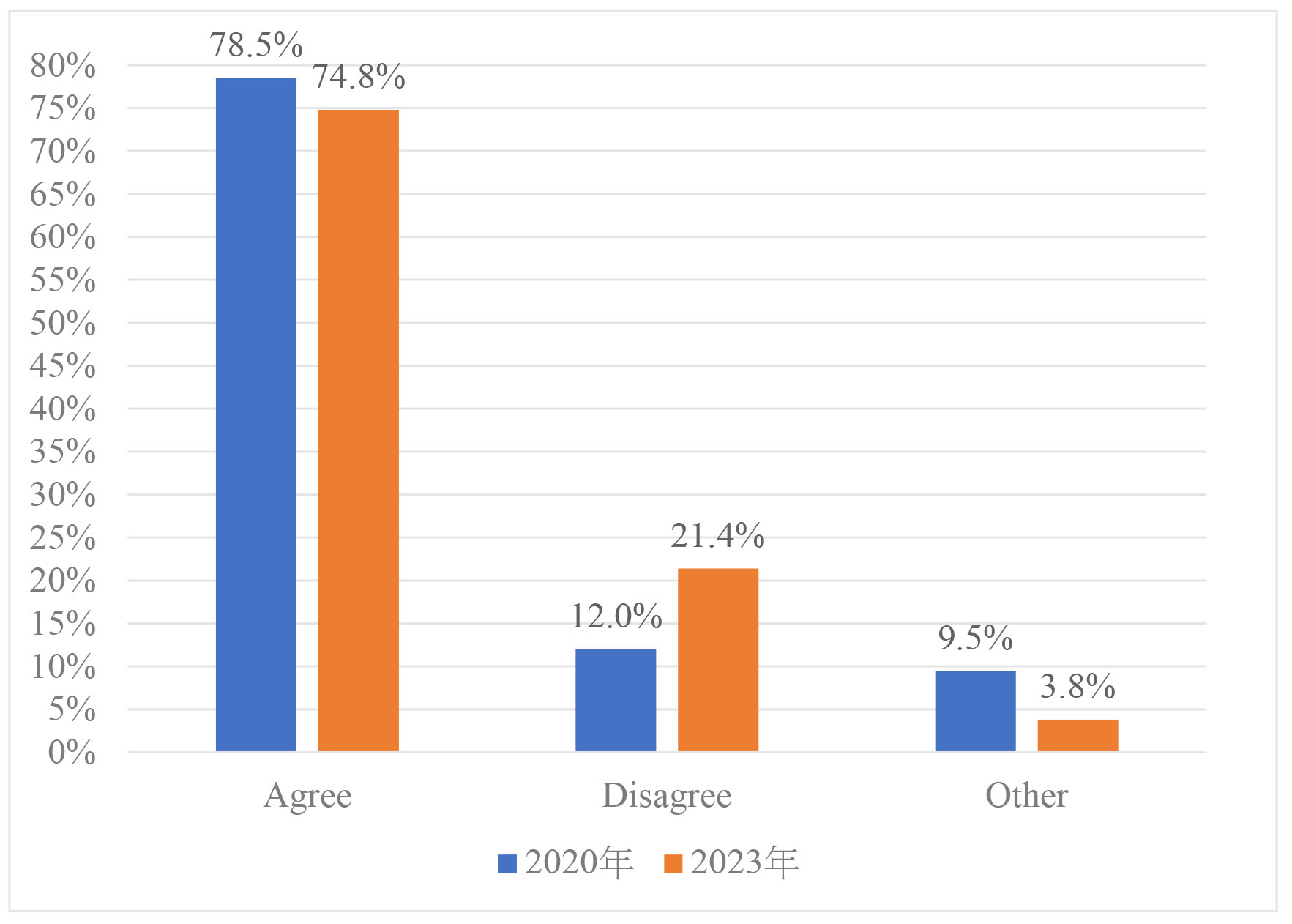
Fig. 2-1 Respondents' Willingness for the Government to Increase the Proportion of Renewable Energy in Power Generation (RSPRC Survey)
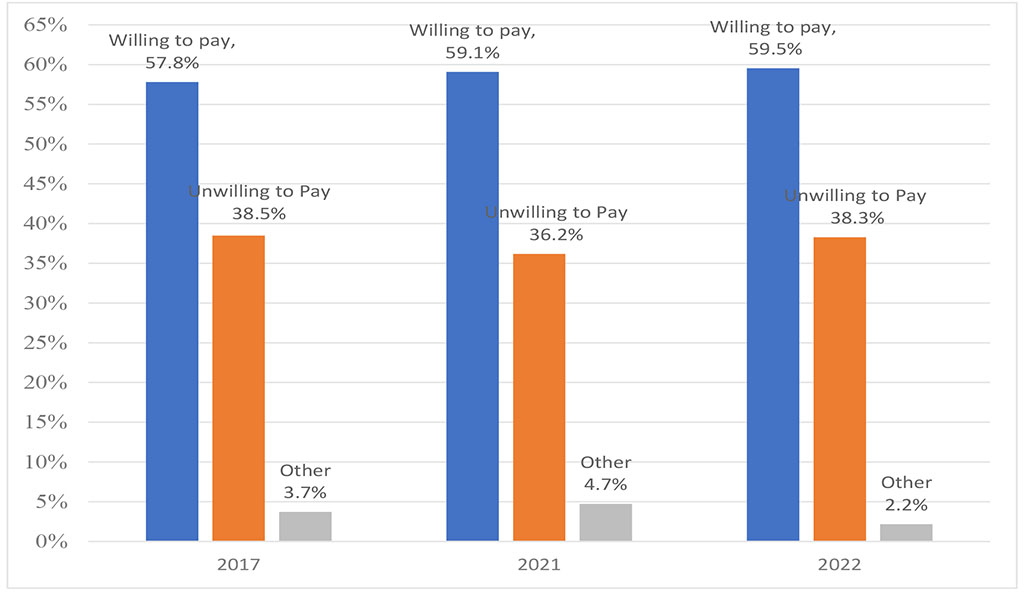
Fig. 2-2 Responses to Whether Respondents are Willing to Pay Higher Electricity Prices for Supporting Renewable Energy (2019, 2021, and 2022 Deep Decarbonization Survey of Academia Sinica)
2.3. Policy implication
The development of renewable energy sources is a pivotal element in climate change policy and net zero transitions. Renewable energy refers to energy that is derived from sources that are constantly and naturally replenished over a short period of time, such as sunlight, wind, water, biomass, and geothermal heat. Furthermore, renewable energy can serve as an alternative to traditional energy that relies on environmentally harmful fossil fuels such as coal, oil, and natural gas.
Consequently, relative survey questions focus on whether respondents support renewable energy the policies. Overall, approximately 70% of respondents support Taiwan taking steps to address global warming and back an energy landscape that prioritizes renewable sources over the next five years.
However, when respondents were asked on their willingness to bear a greater financial burden to support renewable energy, the percentage of those indicating support fell to between 55 and 60%. Nevertheless, this figure still represented a majority of respondents. The shift in this figure indicates that in advocating for renewable energy, the government must consider the potential ramifications of augmented economic outlays on public sentiment.
2.4. Related surveys
|
Other renewable energy questions |
Answer option |
Proportion |
Survey time |
Survey organization |
Survey name |
|
Q16 Do you support the vigorous development of solar power? |
Strongly support & Support |
55.7% |
202312 |
TAISE |
Public Opinion Survey on Climate Change and Energy 2023 |
|
Q17 Do you support the vigorous development of wind power? |
Strongly support & Support |
63.9% |
202312 |
TAISE |
Public Opinion Survey on Climate Change and Energy 2023 |
|
Q17 Do you support the vigorous development of renewable energy? |
Strongly support & Support |
76.6% |
202211 |
TAISE |
Public Opinion Survey on Climate Change and Energy 2022 |
|
Q11 Do you support the development of renewable energy (including solar photovoltaic and wind power generation)? |
Support & Strongly support |
79.5% |
202206 |
TAISE |
The 5th Public Opinion Survey on Electricity Use and Energy Transition in Taiwan |
|
Q10 Do you support the development of renewable energy (including solar photovoltaic and wind power generation)? |
Support & Strongly support |
85.9% |
202106 |
TAISE |
The 4th Public Opinion Survey on Electricity Use and Energy Transition in Taiwan |
|
Q8 The energy transition will encounter a number of challenges affecting both individuals and society as a whole. These include power shortages, limitations on power supply, rising price , and impacts on economic development. Nevertheless, is it reasonable to conclude that Taiwan must undergo a transformation into a region that prioritizes clean, renewable energy sources, despite the challenges and difficulties that this may entail? |
Support |
61.3% |
201804 |
Greenpeace |
Survey on Taiwan People's Support for Energy Transition and Their Willingness to Pay the Price |
|
Q18 Do you support the vigorous development of renewable energy? |
Strongly support & Support |
86.0% |
201803 |
TAISE |
Survey on Climate Change and Energy |
|
Do you support the vigorous development of renewable energy? |
Strongly support & Support |
92.1% |
201703 |
TAISE |
Public Opinion Survey on Climate Change and Energy in Taiwan |
3. Electricity Pricing
3.1. Survey description
Rationalizing electricity pricing is a pivotal issue for climate and energy policy. The relative questions are designed into two types to analyze public attitudes toward rational electricity pricing policy.
The first type asks whether respondents support a progressive electricity price system, wherein the price is directly correlated with the quantity of electricity consumed. In the 2017, 2019, 2021, and 2022 Deep Decarbonization Survey, respondents were asked whether they concurred with the assertion that the price per unit of electricity would increase in proportion to the quantity of electricity consumed by a household. Do you concur with this assertion? The survey results are shown in Fig. 3-1, with 78.9, 64.5, 59.6, and 69.1% of respondents showing support over the years. Although there were fluctuations in the level of support, it remained above 60%.
As for the second type, questions are designed to ask respondents' willingness to increase prices and the specific magnitude of any such increase. In 2018, 2020, and 2023 RSPRC surveys, respondents were asked to indicate their willingness to pay a specified increase in price. These three survey results, as Fig. 3-2 shows, indicate a notable decline in the number of respondents willing to pay a price increase. The highest number of respondents who indicated a willingness to pay a price increase fell in the lowest range of 2.7 to 3.0 TWD over the years. Considering the willingness to pay a price increase, the next highest number of respondents chose "unwilling to pay more" in 2018, "other" in 2020, and "between 3.0 and 3.5 TWD" in 2023.
3.2. Chart
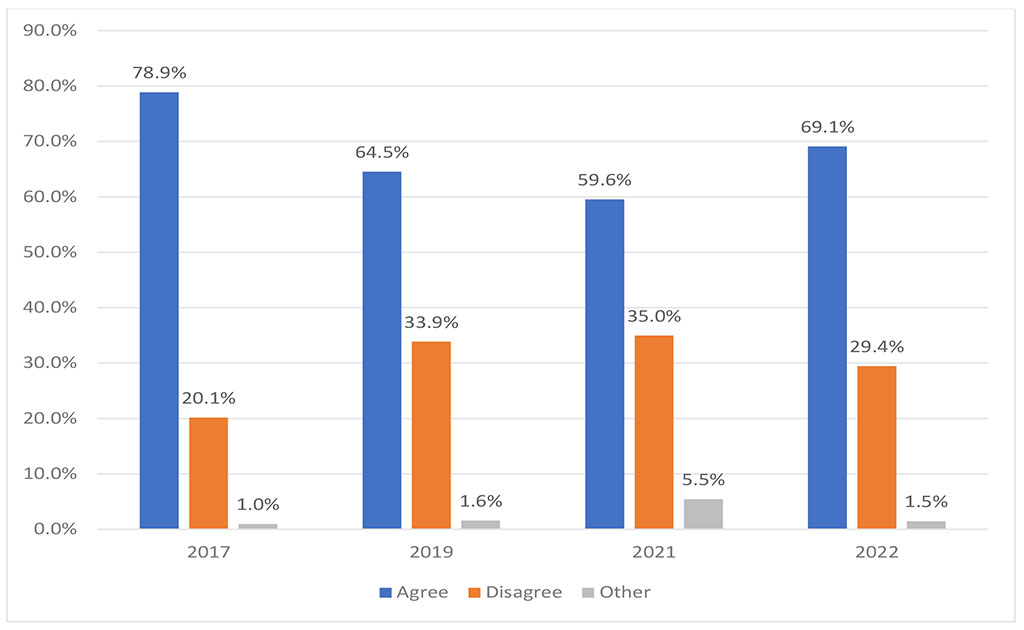
Fig. 3-1 Whether Respondents Agree that the Higher the Electricity Usage, the Higher the price Should Be (2017, 2019, 2021, and 2022 Deep Decarbonization Survey of Academia Sinica)
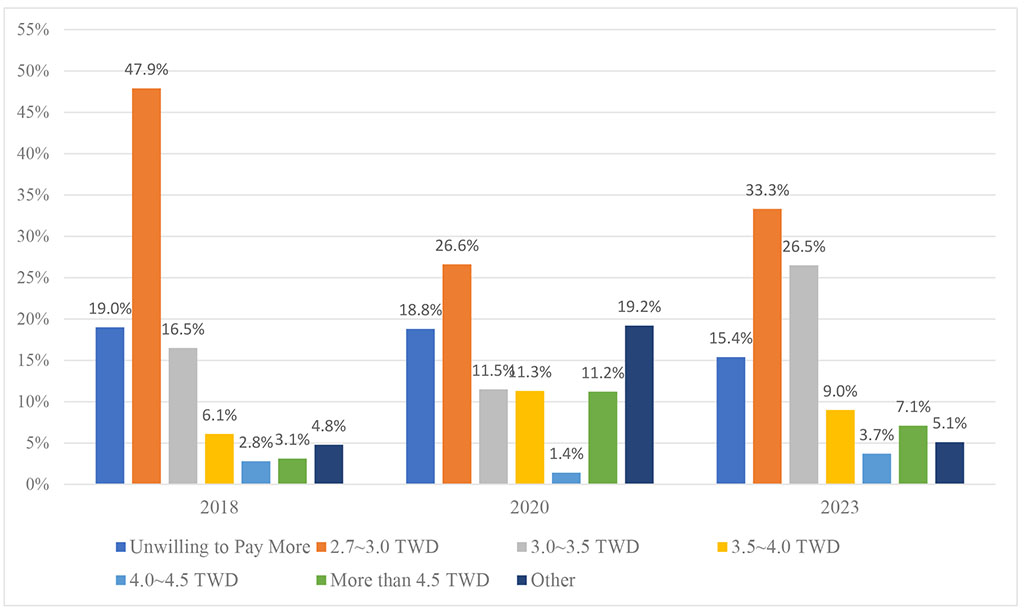
Fig. 3-2 The Degree to Which Respondents are Willing to pay Increased price (2018, 2020, and 2023 RSPRC Survey)
Rational pricing of electricity is a policy tool that provides incentives to control energy consumption or promote energy efficiency by influencing consumer behavior through pricing mechanisms.
A comparison between the Deep Decarbonization Survey of Academia Sinica and RSPRC Survey revealed that in the last 7 years, over 60% of respondents expressed support for the proposition that "the more electricity one uses, the higher the price one should pay." This finding suggests that the majority of people are aware of and accept the principle of usage-based electricity pricing.
However, the situation becomes more complex when considering the RSPRC Survey questions regarding the respondents' willingness and the extent of the increase in greater detail. The majority of respondents indicated a willingness to accept only minimal increases: 2.7 to 3.0 TWD per kWh, with a notable proportion indicating a refusal to accept any increase.
These findings indicate that the public is sensitive to changes in electricity prices. Additionally, they suggest that price increases indeed have the potential to influence electricity consumption behaviors. Notably, the proportion of respondents who indicated their willingness to accept an increase in price between 3.0 and 3.5 TWD rose to 26.5% in the 2023 RSPRC Survey. These findings suggest that the majority of respondents still prefer a moderate change in electricity prices. However, as the public's perception of their ability to cope with climate change evolves, their willingness to pay for a price increase may also differ.
3.3. Related surveys
|
Climate awareness-related question |
Answer option |
Proportion |
Survey time |
Survey organization |
Survey name |
|
Q16 Electricity price is likely to increase in the future. What is the maximum extent of an increase in the price per kWh that you are willing to accept? |
Up to 10% |
50.1% |
202306 |
TAISE |
The 6th Public Opinion Survey on Electricity Use and Energy Transition in Taiwan |
|
Q18 Electricity price is likely to increase in the future. What is the maximum extent of an increase in the price per kWh that you are willing to accept? |
Up to 10% |
40.7% |
202206 |
TAISE |
The 5th Public Opinion Survey on Electricity Use and Energy Transition in Taiwan |
|
Q18 Electricity prices are likely to increase in the future. What is the maximum extent of an increase in the price per kWh that you are willing to accept? |
Up to 10% |
58.4% |
202106 |
TAISE |
The 4th Public Opinion Survey on Electricity Use and Energy Transition in Taiwan |
|
Q20 What is your assessment of the current price in Taiwan: is it high or low? |
Low & Very low |
42.2% |
201803 |
TAISE |
Survey on Climate Change and Energy |
4. Sustainable Development
4.1. Survey Illustration
Sustainable development often requires balancing economic and environmental priorities. From an environmental-sociological perspective, the Taiwan Social Change Survey (TSCS), conducted by the Academia Sinica, included questions addressing these trade-offs in its environment-related sections in the 2000 and 2010 survey waves. Respondents were asked whether they would lower their living standards, pay significantly higher prices for goods and services, and pay substantially higher taxes to protect the environment. The goal was to examine the extent to which individuals were willing to adopt various environmentally friendly behaviors, each carrying different levels of economic impact. Among these, reducing one's living standards represented the least financial burden, followed by paying higher prices, while paying higher taxes posed the most significant economic challenge. Respondents who were willing to engage in these behaviors demonstrated a higher level of awareness regarding sustainable development. To present the results more clearly, we consolidated the response categories across the two surveys: "strongly willing" and "moderately willing" were combined into a single "willing". In contrast "not very willing" and "quite unwilling" were grouped under "unwilling." All other responses were classified as "other." Figure 4-1 displays the consolidated results.
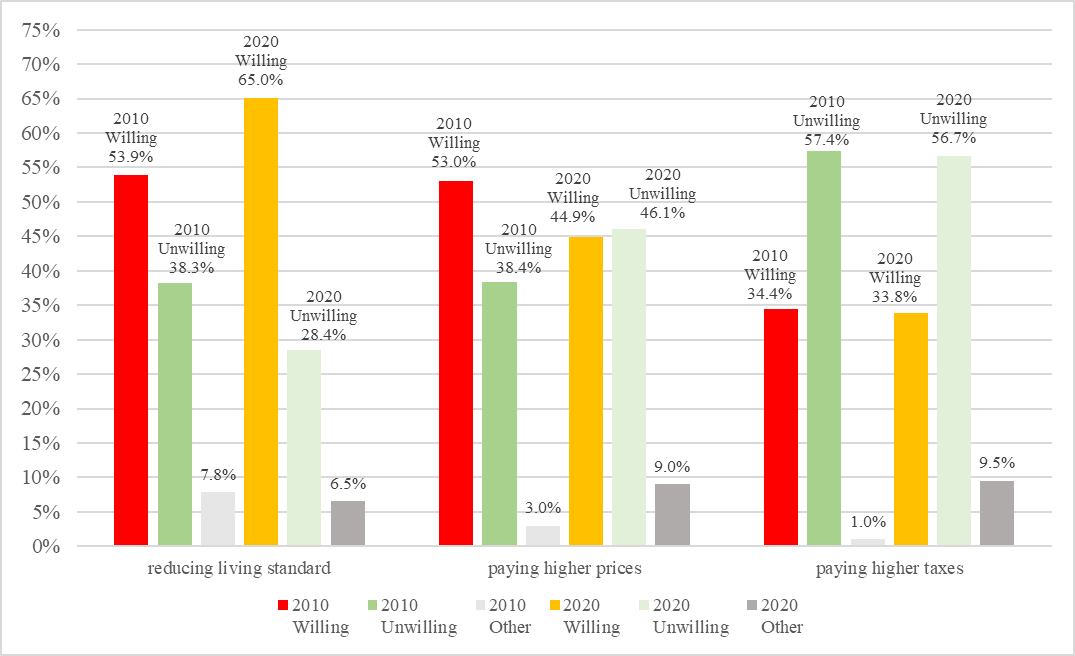
Figure 4-1 Survey of behaviors that respondents were willing to adopt for environmental protection (Taiwan Social Change Survey of the Academia Sinica)
As defined in the TSCS, "lowering living standards" refers to actions such as refraining from using air conditioning or driving less frequently—behaviors that impose the mildest economic impact. According to the survey results, 53.9% of respondents in 2010 were willing to lower their living standards for environmental protection; this figure increased to 65% in 2020. In contrast, significantly fewer respondents were willing to "pay higher prices for goods and services," a behavior that carries
a greater economic burden. In 2010, 53% of participants expressed willingness to pay higher prices for goods and services, but this proportion declined to 44.9% in 2020. Regarding the most economically demanding behavior—paying higher taxes—34.4% of respondents were willing to do so in 2010, dropping slightly to 33.8% in 2020.
While the TSCS conducted by Academia Sinica emphasizes environmental-sociological perspectives, the 2023 survey of the Risk Society and Policy Research Center (RSPRC) at National Taiwan University(NTU) focuses on the economic-environmental trade-off in the context of climate-related policymaking. One key question asked was: "Do you agree with the statement that policies aimed at reducing greenhouse gas emissions slow down economic growth?" For analysis, we consolidated the responses: "strongly agree" and "agree" were grouped as agree, "strongly disagree" and "disagree" as disagree, and all remaining responses as other. Figure 4-2 presents the results. Participants who agreed and disagreed with the statement accounted for 43.5% and 43.7%, respectively. This narrow margin highlights the divergence in public opinion regarding the relationship between reducing greenhouse gas emissions and economic growth.
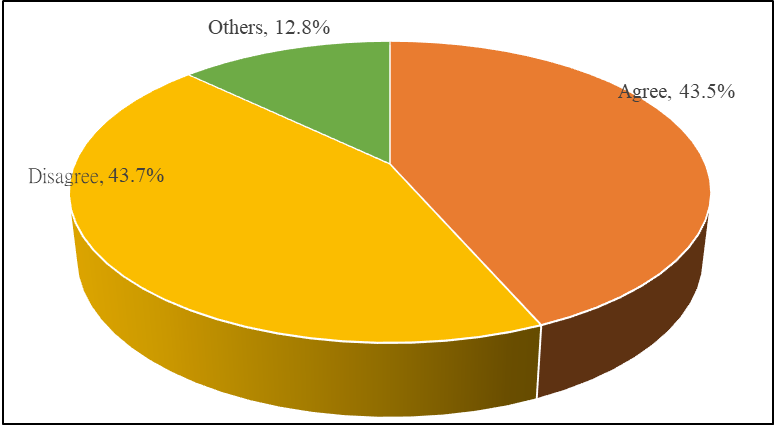
Figure 4-2 Participants’ perspectives on the relationship between reducing GHG emissions and slowing down economic growth (RSPRC )
4.2. Implications for policymaking
Sustainable development is a core value of the contemporary environmental agenda. The United Nations report Our Common Future defines sustainable development as meeting "the needs of the present without compromising the ability of future generations to meet their own needs." This definition prompts a reexamination of development-driven economic models and emphasizes balancing economic growth, environmental protection, and social equality. From the standpoint of sustainable progress, addressing climate change and achieving net-zero transitions require controlling greenhouse gas emissions, which fundamentally involves transitioning the energy system. Compared to most environmental issues, climate change and net-zero transitions have more pronounced economic impacts due to necessary measures such as reducing the use of fossil fuels and promoting the development of renewable energy.
Based on the surveys discussed above, we can identify two levels of environmental awareness among the participants. The first level is reflected in the results of the TSCS of the Academia Sinica. First, regarding the willingness to adopt behaviors that may lower living standards (and thus have less severe economic consequences), the percentage of participants expressing support increased from 53.9% in 2010 to 65% in 2020. Meanwhile, the proportion of those unwilling to do so decreased significantly from 38.3% to 28.4%. Second, when environmental protection involves more noticeable economic effects, such as increased costs, support is weakened. While 53% of participants were willing to pay higher prices for goods and services in 2010, only 44.9% were willing in 2020. Conversely, those unwilling to accept higher prices rose from 38.4% in 2010 to 46.1% in 2020.
Third, regarding the willingness to pay higher taxes for environmental protection, only 34.4% were supportive in 2010, slightly decreasing to 33.8% in 2020. The percentage of participants unwilling to pay higher taxes remained high, at 57.4% in 2010 and 56.7% in 2020. These results suggest that while participants may generally support sustainable development, their willingness varies depending on the level of economic impact. Therefore, to effectively promote sustainable development, strategies should be designed with careful consideration of their economic implications. Moderate approaches and supportive policies can help mitigate potential economic burdens and enhance public acceptance.
The second level of environmental awareness is reflected in the results of the RSPRC survey, which examined whether reducing greenhouse gas emissions is linked to slow economic growth. The small gap between the percentages of participants agreeing and disagreeing with this claim indicates divergent views on the relationship between carbon reduction and economic performance. The government must recognize these differing perspectives to incorporate sustainable development effectively into climate-related policymaking. As such, it is essential to communicate nuanced, well-balanced policies and to address the concerns of those who believe that carbon reduction may hinder economic growth.
5. Intergenerational Climate Justice
5.1. Survey Details
The surveys on intergenerational climate justice consisted of two parts. The first part involved two surveys conducted by the RSPRC at National Taiwan University in 2020 (1,087) and 2023 (1,075). Both surveys asked respondents whether they agreed that "Taiwan should actively pursue an energy transition; otherwise, future generations will face severe climate disasters." In the 2020 survey, the response options strongly agree and moderately agree were grouped under agree, while slightly disagree and strongly disagree were grouped under disagree. All other responses were categorized as other. Similarly, in the 2023 survey, strongly agree, agree, and moderately agree were grouped as agree, slightly disagree, and strongly disagree as disagree, and all remaining responses as other. Figure 5-1 presents the results, showing that 82.4% of participants in 2020 and 82.9% in 2023 agreed that Taiwan should actively advance an energy transition to avoid climate disasters for future generations.
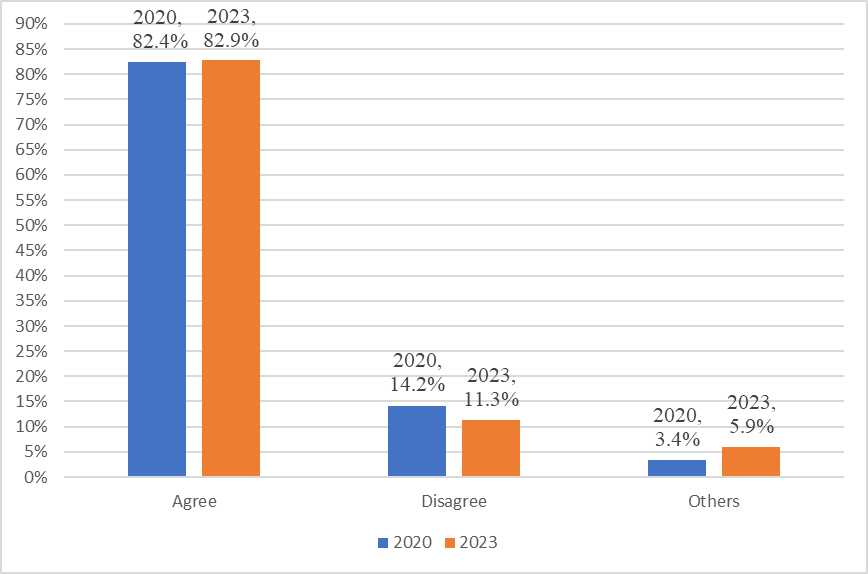
Figure 5-1 Results of the survey question on whether participants agreed that Taiwan should actively pursue an energy transition to protect future generations from severe climate disasters (RSPRC).
The second part of the survey consisted of a low-carbon survey conducted by Academia Sinica in 2022. The survey included two sets of questions related to intergenerational climate justice, which we designated Question Set A and Question Set B. Each set comprised five items. 1,233 respondents were randomly assigned to one of the two sets. Question Set A was designed with a narrative framing, asking respondents to imagine themselves as future individuals reflecting on present-day climate actions. The five items were as follows:
- Imagine there is a time machine that can take you to Taiwan in 2050, where you can experience the living environment and meet future residents. After returning to the present, please answer the following question as a member of a future generation: Do you agree that reducing carbon emissions is essential for the well-being of future generations?
- Imagine you have returned to the present from the future, and someone tells you, "Future generations will face more severe impacts of climate change compared to your generation." Do you agree?
- Imagine you have returned to the present from the future. Do you agree that reducing carbon emissions is essential for the well-being of yourself and your family?
- Imagine you have returned to the present from the future, and someone says, "Our generation should take action to reduce carbon emissions for the benefit of future generations." Do you agree?
- Imagine you have returned to the present from the future, and someone says, "It is vital to leave a clean homeland for future generations." Do you agree?"
A total of 580 participants responded to Question Set A. In contrast, Question Set B presented the same five themes but without the narrative framing:
- Do you agree that reducing carbon emissions is important for the well-being of future generations?
- Someone says, "Future generations will face more severe impacts of climate change than your generation." Do you agree?
- Do you agree that reducing carbon emissions is important for the well-being of yourself and your family?
- Someone says, "Our generation should take action to reduce carbon emissions for the benefit of future generations." Do you agree?
- Someone says, "It is vital to leave a clean homeland for future generations." Do you agree?
A total of 653 participants responded to Question Set B.
To facilitate a clearer interpretation of the results, we first combined similar items from Question Sets A and B. Since both sets used Likert scales—ranging either from strongly disagree to strongly agree or from very unimportant to very important—we consolidated the responses into two categories: affirmative attitude and negative attitude. As all ten items were phrased as positive statements, responses of strongly agree and agree (or very important and important) were classified as indicating an affirmative attitude. Figure 5-2 presents the consolidated results.
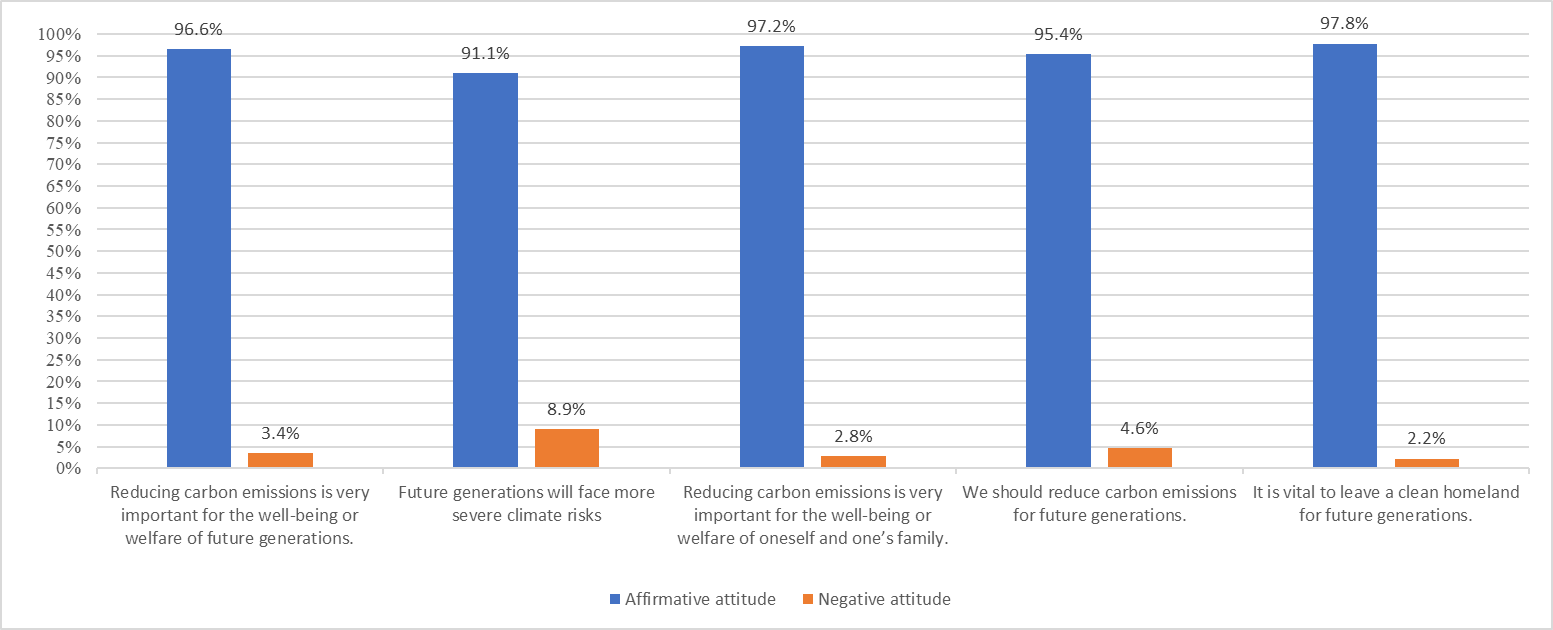
Figure 5-2 Participant Perspectives on Intergenerational Climate Justice in the 2022 Academia Sinica Low-Carbon Survey
5.1. Implications for Policymaking
Intergenerational climate justice is all about recognizing that climate issues affect us, and future generations. It comes down to two main ideas. First, it's about realizing that the emissions we're putting out today have serious consequences for the planet and the people living here after us. Second, it highlights how important our decisions are now—like investing in clean energy and improving our ability to adapt to climate change—so we can leave behind a healthier, more livable world for the next generations.
Surveys by the RSPRC in 2020 and 2023, and a 2022 low-carbon survey by Academia Sinica show that many people get this. When asked about taking action now to protect future generations, most respondents were on board. In the RSPRC surveys, around 82% agreed that "Taiwan should actively work toward an energy transition to protect future generations from climate risks." In Academia Sinica's 2022 survey, a vast majority—96.6%—felt that cutting greenhouse gas emissions is important for the well-being of future generations, and 97.2% said it's also vital for their own families. On top of that, 91.1% believe future generations will face even more serious climate challenges than we do now. Nearly everyone agreed—95.4% said we should take action to reduce emissions for the sake of the future, and 97.8% felt we should leave behind a clean and livable homeland.
All of this points to strong public support for intergenerational climate justice. That support gives us three important takeaways for shaping climate policy: First, we need to think about who's responsible for emissions and how we share natural resources fairly between generations. Second, we should be aware of how climate risks get passed down and aim for a better balance between people and nature. Third, even though future generations aren't here to speak for themselves, we should build decision-making processes today that consider their rights and well-being. It's up to us to make sure their voices are considered, even if they're not at the table yet.
6. Climate-related knowledge
Taiwan's electricity is currently generated primarily from coal, followed by natural gas, renewable energy, nuclear energy, and oil. According to the Monthly Report on Energy Statistics published by the Energy Administration under the Ministry of Economic Affairs (MOEA ), Taiwan generated 282.136 terawatt-hours of electricity in 2023. Of that, coal-fired power comprised 42.24%, gas-fired power accounted for 39.57%, renewable energy contributed 9.47%, nuclear power provided 6.31%, and oil-fired power made up 1.34%. Climate-related surveys often include questions to assess how well people understand this energy mix—particularly the sources and methods used to generate electricity in Taiwan.
To explore public knowledge on this topic, we looked at surveys conducted by RSPRC and the low-carbon surveys conducted by Academia Sinica. In the 2018 and 2020 RSPRC surveys, participants were asked questions such as: Which of the following is Taiwan's primary source of power generation?" "Do you know which of the following methods generates the most electricity in Taiwan?" Similarly, Academia Sinica asked: Which of the following do you think is the most important power generation source in Taiwan?" in its 2019, 2021, and 2022 surveys. For consistency, we grouped similar answer choices in our analysis: "Fuel oil" and "petroleum" were treated as the same, "Fuel gas" and "natural gas" were also considered identical, and various renewable sources (like hydropower, wind, solar) were combined into one category. Responses like "no answer," "don't know," or "refuse to answer" were grouped under "other." Figure 6-1 shows the results.
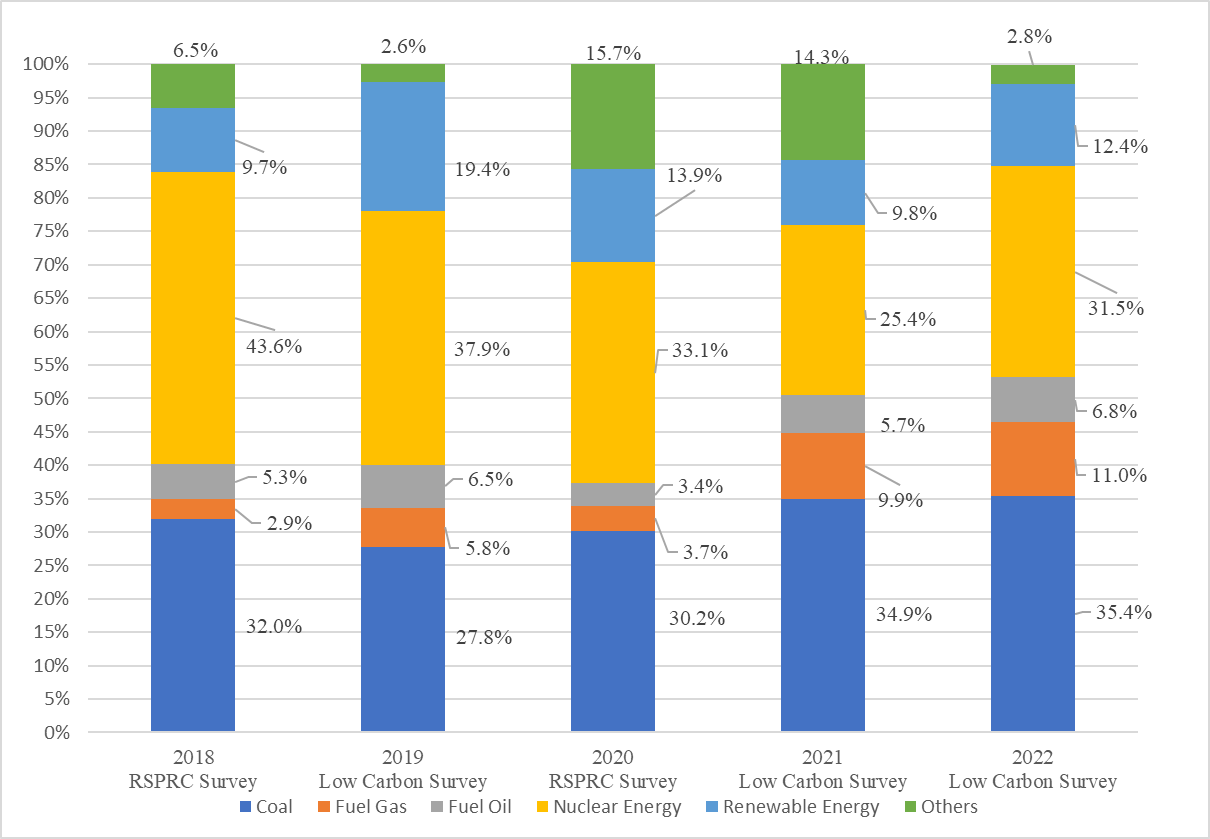
Figure 6-1 Participants’ knowledge of Taiwan's major power generation methods
(Data obtained from the surveys of the RSPRC and the Academia Sinica)
The findings suggest that many people in Taiwan have misconceptions about the country's energy mix. For example, only about 30% of respondents correctly identified coal as the main source of electricity. In 2019, that number dropped as low as 27.8%. Despite natural gas being the second-largest source, only 2.9% to 11% of respondents across the surveys recognized it as such. Interestingly, some respondents overestimated the role of nuclear energy in Taiwan's electricity production. In the 2018, 2019, 2020, 2021, and 2022 surveys, 43.6%, 37.9%, 33.1%, 25.4%, and 31.5% of participants, respectively, believed nuclear power was Taiwan's primary source of electricity.
6.1. Implications for Policymaking
While climate change encompasses many issues, a fundamental understanding of energy production and consumption is essential for effective participation in climate governance. The climate agenda is notably complex, involving contested debates over the causes and consequences of climate change, as well as the scientific and technological expertise required to address these challenges. Compared to other environmental agendas, climate-related issues often demand a deeper level of comprehension. A central component of this agenda involves recognizing the critical role of energy use—particularly fossil fuel combustion—in the emission of greenhouse gases that drive global warming. Familiarity with the structure of energy consumption among individuals or groups can indicate of their baseline understanding of climate-related dynamics. Such awareness enhances the likelihood of adopting informed and appropriate responses to climate change, thereby contributing to a more robust foundation for evidence-based climate governance.
Despite consistent change in Taiwan's power generation mix, the overall proportions of primary energy sources have remained relatively stable, as illustrated in Table 6-1, which presents the composition of Taiwan's power generation from 2018 to 2023 (based on the Energy Statistics Database of the Energy Administration of the MOEA). Throughout this period, coal remained the predominant source of electricity, consistently accounting for over 40% of total power generation. Natural gas, serving as a transitional energy source, ranked second to coal and demonstrated a gradual upward trend. In contrast, which represented approximately 10% at the beginning of the period, showed a steady decline, decreasing to 6.3% by 2023. Meanwhile, electricity generated from renewable sources and pumped-storage hydroelectricity steadily increased from 5.9% in 2018 to 10.6% in 2023.
Table 6-1 Taiwan's power generation structure from 2018 to 2023
|
|
2018 |
2019 |
2020 |
2021 |
2022 |
2023 |
|
Renewable energy, pumped-storage hydroelectricity |
5.82% |
6.74% |
6.55% |
7.12% |
9.35% |
10.60% |
|
Nuclear energy |
10.05% |
11.79% |
11.23% |
9.55% |
8.24% |
6.31% |
|
Fuel oil |
2.97% |
2.13% |
1.58% |
1.83% |
1.54% |
1.34% |
|
Fuel gas |
33.54% |
33.24% |
35.67% |
37.23% |
38.87% |
39.54% |
|
Coal |
47.64% |
46.10% |
44.97% |
44.27% |
42.00% |
42.21%
|
Source: Energy Statistics Database of the Energy Administration of the MOEA
A comparison between Taiwan's actual energy structure and the public's understanding of it reveals a significant discrepancy between factual data and public awareness regarding the causes of climate-related challenges. One contributing factor is that, compared to most environmental matters, the underlying causes of climate change and the associated mitigation strategies are more complex and less easily understood by the general public.
A 2021 survey conducted by Greenpeace, for instance, asked respondents: "To address climate change, countries around the world have signed the Paris Agreement, which aims to limit global warming to within 1.5º Celsius. Accordingly, many countries have set targets to achieve net-zero emissions. To your knowledge, what is Taiwan's current goal for reducing carbon emissions?" Among the participants, only 20.9% could provide the correct answer of "reducing 50% of carbon emissions by 2050." Similarly, in a survey on climate change conducted by Mom Loves Taiwan in 2022, only 35.9% of participants were aware of the government's net-zero emissions goal in their responses to the question, "Do you know that the government has proposed a net-zero emissions goal to cope with climate change?" For another thing, most participants underestimated the proportion of coal-fired power generation and the amount of resulting carbon emissions because they lacked sufficient climate-related knowledge.
Meanwhile, the public overestimated the significance of nuclear power in Taiwan's energy structure. In the 2018 survey of the RSPRC, as many as 43.6% of participants regarded nuclear energy as Taiwan's primary energy source. Thus, we believe energy education and social communication should be strengthened during climate- and energy-related decision-making. For instance, it is essential to help the public understand that a single-source energy supply might not be as indispensable as imagined.
Such efforts will enable the public to engage in energy structure debates with a more envidence-based perspective. Moreover, if the public can be guided to comprehend the role that specific energy sources play during an energy transition (such as the transitional role of fuel gas in reducing greenhouse gases), society will be able to gain a deeper understanding of the significance of setting up natural gas terminals.

This work is licensed under a Creative Commons Attribution-NonCommercial-NoDerivatives 4.0 International License.
※The aforementioned may not be copied for commercial use without the center's consent, thank you.※
